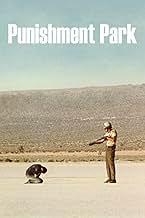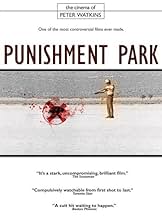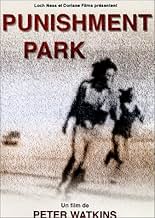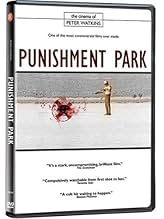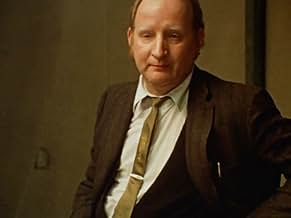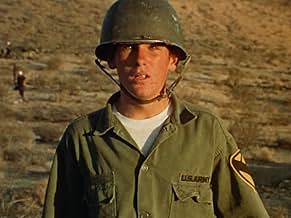Füge eine Handlung in deiner Sprache hinzu"Punishment Park" is a pseudo-documentary purporting to be a film crews's news coverage of the team of soldiers escorting a group of hippies, draft dodgers, and anti-establishment types acro... Alles lesen"Punishment Park" is a pseudo-documentary purporting to be a film crews's news coverage of the team of soldiers escorting a group of hippies, draft dodgers, and anti-establishment types across the desert in a type of capture the flag game. The soldiers vow not to interfere with t... Alles lesen"Punishment Park" is a pseudo-documentary purporting to be a film crews's news coverage of the team of soldiers escorting a group of hippies, draft dodgers, and anti-establishment types across the desert in a type of capture the flag game. The soldiers vow not to interfere with the rebels' progress and merely shepherd them along to their destination. At that point, ha... Alles lesen
- Auszeichnungen
- 1 wins total
- James Daly, Defense Attorney
- (as Frederick Franklyn)
Empfohlene Bewertungen
Great movie!!!
The film is inspired by the upheaval of the late sixties in the US, when the government has increased its legitimized use of violence and oppression, while the anti-war movement reacts increasingly violent and radical. In order to deal with both this, the overpopulation of prisons and to provide special training to riot police units, the government has introduced the so-called punishment parks. Convicted 'criminals', mostly activists, are given the 'choice' to either be locked up in prison for years and years, or spend three days in one of these parks, where they either gain their freedom their death or an even longer prison sentence. The situation in the parks is beyond their worst expectations, however. It reminded me of a sort of realistic version of Battle Royale (2000).
The film's structure is extremely effective and recalls parallels with Cannibal Holocaust, which is made almost 10 years later. Both movies are constructed and filmed in such a way that the viewer is challenged in thinking and feeling he is actually watching a real documentary and therefore shocked, even though aware of the fact that: this is a film. Both confront us with the inherently violent nature of mankind, but where Cannibal Holocaust is devoid of any deeper meaning (above all, it is an exploitation movie in every sense of the word) and does not raise any critical questions about the state of the world, Punishment Park does just that.
I have been profoundly impressed with Punishment Park and find it hard to believe how such a powerful and important film could have been rejected and marginalized for so long. Maybe that says enough about the truth of its content, about the way power structures in this world function. I do not agree with the critique that Watkins polarizes and stereotypes, because the movie depicts activists and the keepers of the legitimized power structures who are in reality as polarized as they are here. If they weren't, there would not be any conflict and therefore no change in our societies. In reality, confrontations between these two groups often take stereotypical forms, whether you place them between activists and establishment in Latin America, Russia or New York City. If these groups would not be polarized to these extremes, the activists would be part of the silent majorities that tacitly complain but at the same time reside in the injustices of the world.
As Peter Watkins tells us in the introduction on the DVD, the actors in Punishment Park are for the most part amateurs. Most kids were real activists from LA, most policemen had been part of the national forces and even some of the members of the tribunals are part of the social and political establishment of the time. Not introducing both groups previous to the shooting of the scenes taking place in the improvised court room, adds to spontaneous and improvised feel. Parallels are drawn with issues of the time, such as the repression of Black Panther members (one of the black prisoners is said to resemble the convicted charismatic BPleader Bobby Seale) and the trial of the Chicago seven.
I admire Watkins' obvious and sincere engagement with injustice and his concern with human rights and the increasingly repressive measures taken by governments (nowadays in the name of the War in Terror) to silence those that do not agree and refuse to be brainwashed. Punishment Park remains to be an extremely important movie that should be shown in schools and seen by everybody who shares these concerns. Maybe its marginalization can finally be made up for.
California desert using his patent faux documentary style, Watkins
creates a film like no other. He follows two groups of prisoners (one
pre-sentenced the other post-sentenced) throughout the picture. After
they're tried by a military tribunal, they have the choice of either
serving out a prison sentence or they can participate in Punishment
Park (a grueling three day hike through the desert with nothing but the
clothes on their backs) whilst being hunted down by local law
enforcement officers who use the park as a live action training
ground). I can't say enough about this movie. Sometimes it feels as if
you're watching a real documentary. This is one of Peter Watkins most
accessible films. I advise you to look out for it. You wont regret it!
Highly recommended
A+
Now consider Punishment Park. As Privilege challenges the viewer to examine what is being sold to us, and why, Punishment Park demands that we reckon with what is being taken from us, and why.
Heaven help America, and for that matter the world, if contemporary politicians get their hands on this film. It is already so close to reality, that in viewing it recently, I experienced a genuine, nauseating feeling of anxiety.
Watkins again skillfully employs a documentary-style narrative. Whereas in Privilege some rough edges to this technique were apparent, in Punishment Park it has been honed to sharp, seamless perfection. The sense of realism is enhanced by disarmingly unpretentious, economical, believable portrayals by the entire cast. This is the kind of acting Hollywood has completely turned its back on, to its detriment, in favor of cosmetically perfect image projections. The cast has first-rate material to work with in Watkins' screenplay.
Many cinematic visionaries have tried to shake the viewer out of their complacent, false sense of security. No one has ever achieved this result with such stark and chilling accuracy as Peter Watkins does here.
"What seems quite clear now, is that instead of trying to bring the estranged and excluded Americans, such as these people, back into the national community, the Administration has chosen to accept and exploit the present division within the country, and to side with what it considers is the majority. Instead of the politics of reconciliation, it has chosen the politics of polarization."
To paraphrase one of the characters, we don't have to call them pigs because they know what they are. Better than we do.
Wusstest du schon
- WissenswertesMany of the "actors" were not acting in a traditional sense. In the introduction, Peter Watkins says many protesters were real-life protesters, and most soldiers were real-life conservatives. All improvised lines based on their opinions. There were no rehearsals.
- PatzerIn her tribunal closing statement, Alison Mitchner makes reference to the Preamble to the Constitution of the United States, and uses the phrase "life, liberty and the pursuit of happiness". This phrase is in the second sentence of the Declaration of Independence, not the Constitution.
- Zitate
Mary Jurgens, Tribunal Member: [shouting] You are immoral!
Jay Kaufman, Tribunal Defendant: I am not immoral.
[she continually interrups with shouting]
Jay Kaufman, Tribunal Defendant: You want me to tell you what's immoral? War is immoral! Poverty is immoral! Racism is immoral! Police brutality is immoral! Opression is immoral! Genocide is immoral! Imperialism is immoral! This country represents all those things!
- Crazy CreditsThere are no opening credits at all. The title doesn't appear until halfway through the closing credits.
- VerbindungenFeatured in Hagan Reviews: Punishment Park (2017)
Top-Auswahl
- How long is Punishment Park?Powered by Alexa
Details
Zu dieser Seite beitragen



